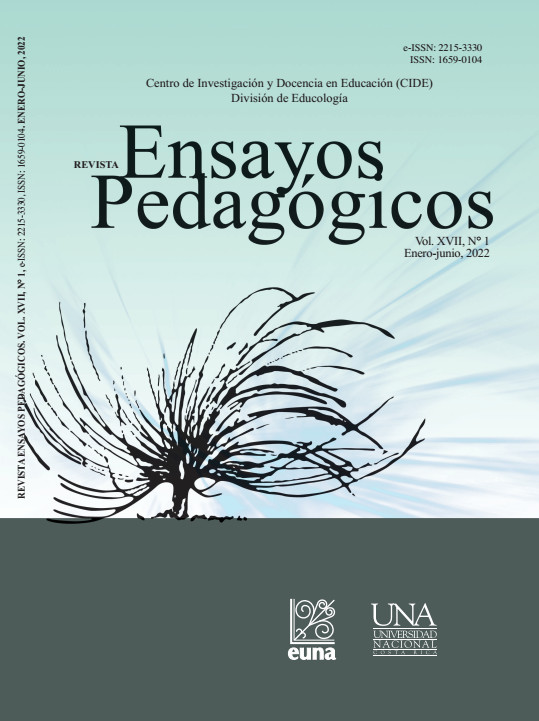Habilidades socioemocionales en directores de educación básica. Revisión sistemática de literatura
DOI:
https://doi.org/10.15359/rep.17-1.11Palabras clave:
directores escolares, educación básica, desarrollo afectivo, liderazgo, relaciones interpersonalesResumen
Las habilidades socioemocionales son distintivos inseparables del rol de líder que desempeñan los directores escolares en educación básica, por lo que se torna necesario conocer cuáles de ellas se destacan en la literatura. El presente artículo explora sistemáticamente la literatura existente acerca de directores escolares de educación básica, con énfasis en las habilidades socioemocionales que se destacan en el desempeño de su rol como líder de la comunidad escolar. La exploración se basa en una revisión sistemática de literatura, la cual permite conocer a profundidad un tema específico. Los resultados demuestran que todos los artículos identificados hacen referencia a alguna habilidad socioemocional específica; la mayoría de las investigaciones son basadas en métodos cualitativos; los estudios cuantitativos declaran limitaciones en la representatividad de los resultados; además de que existe la tendencia de recomendar el uso de métodos mixtos en futuras investigaciones.
Referencias
Banjarnahor, H., Hutabarat, W., Sibuea, A. M. y Situmorang, M. (2018). Job Satisfaction as a Mediator between Directive and Participatory Leadership Styles toward Organizational Commitment. International Journal of Instruction, 11(4), 869-888. https://doi.org/10.12973/iji.2018.11455a
Barnett, B. G., Shoho, A. R. y Okilwa, N. S. (2017). Assistant principals’ perceptions of meaningful mentoring and professional development opportunities. International Journal of Mentoring and Coaching in Education, 6(4), 285-301. https://doi.org/10.1108/IJMCE-02-2017-0013
Bettany-Saltikov, J. (2012). How to do a systematic literature review in nursing: A step-by-step guide. Open University Press.
Buttram, J. L. y Farley-Ripple, E. N. (2016). The role of principals in professional learning communities. Leadership and Policy in Schools, 15(2), 192-220. https://doi.org/10.1080/15700763.2015.1039136
Castillo, F. A. y Hallinger, P. (2018). Systematic review of research on educational leadership and management in Latin America, 1991–2017. Educational Management Administration y Leadership, 46(2), 207-225. https://doi.org/10.1177/1741143217745882
Cherkowski, S. y Walker, K. (2016). Purpose, passion and play: Exploring the construct of flourishing from the perspective of school principals. Journal of Educational Administration, 54(4), 378-392. https://doi.org/10.1108/JEA-10-2014-0124
Cobb, C. (2015). Principals play many parts: a review of the research on school principals as special education leaders 2001–2011. International Journal of Inclusive Education, 19(3), 213-234. https://doi.org/10.1080/13603116.2014.916354
Cravens, X. y Drake, T. (2017). From Shanghai to Tennessee: Developing instructional leadership through teacher peer excellence groups. International Journal for Lesson and Learning Studies, 6(4), 348-364. https://doi.org/10.1108/IJLLS-12-2016-0062
Crawford, M. (2009). Getting to the heart of leadership: Emotion and Educational Leadership. SAGE Publications Ltd.
Döş, I. y Savaş, A. C. (2015). Elementary School Administrators and Their Roles in the Context of Effective Schools. SAGE Open, 5(1), 1-11. https://doi.org/10.1177/2158244014567400
Fletcher, J. y Nicholas, K. (2016). What can school principals do to support students and their learning during and after natural disasters? Educational Review, 68(3), 358-374. https://doi.org/10.1080/00131911.2015.1114467
Glasserman, L. D., Torres-Arcadia, C. y Nava-Lara, S. (2019). Innovación educativa en estudios sobre gestión educativa: una revisión sistemática de literatura. En M. S. Ramírez-Montoya y J. R. Valenzuela (Eds.), Innovación educativa: tendencias globales de investigación e implicaciones prácticas (pp. 265-284). Octaedro.
Hameiri, L. y Nir, A. (2016). Perceived uncertainty and organizational health in public schools: The mediating effect of school principals’ transformational leadership style. International Journal of Educational Management, 30(6), 771-790. https://doi.org/10.1108/IJEM-05-2014-0060
Hanselman, P., Grigg, J., K. Bruch, S. y Gamoran, A. (2016). The consequences of principal and teacher turnover for school social resources. En G. Kao y H. Park (Eds.), Family environments, school resources, and educational outcomes (pp. 49-89). Emerald Group Publishing Limited. https://doi.org/10.1108/S1479-353920150000019004
Kawasaki, T. e Iida, J., (2018). Factors affecting the aspirations of teachers to become school administrators: presence of a role model and experience in school management, Japanese Journal of Educational Psychology, 66, 67-80. https://doi.org/10.5926/jjep.66.67
Kelchtermans, G., Piot, L. y Ballet, K. (2011). The lucid loneliness of the gatekeeper: exploring the emotional dimension in principals’ work lives, Oxford Review of Education, 37(1), 93-108. https://doi.org/10.1080/03054985.2010.545192
Kitchenham, B. y Charters, S. (2007). Guidelines for performing systematic literature reviews in software engineering Version 2.3 (Report No. EBSE-2007-01). Keele University and University of Durham.
Korumaz, M. (2016). Invisible barriers: the loneliness of school principals at Turkish elementary schools. South African Journal of Education, 36(4), 1-12. https://doi.org/10.15700/saje.v36n4a1302
Lee, D., Watson, S. L. y Watson, W. R. (2019). Systematic literature review on self-regulated learning in massive open online courses. Australasian Journal of Educational Technology, 35(1), 28-41. https://doi.org/10.14742/ajet.3749
Lenskaya, E. y Brun, I. (2016). Are Principals of Russian Schools Ready for Transformational Leadership. Educational Studies, 2, 62-99. https://doi.org/10.17323/1814-9545-2016-2-62-99
Li, L., Hallinger, P. y Walker, A. (2016). Exploring the mediating effects of trust on principal leadership and teacher professional learning in Hong Kong primary schools. Educational Management Administration y Leadership, 44(1), 20-42. https://doi.org/10.1177/1741143214558577
Li, L., Hallinger, P., Kennedy, K. J. y Walker, A. (2017). Mediating effects of trust, communication, and collaboration on teacher professional learning in Hong Kong primary schools. International Journal of Leadership in Education, 20(6), 697-716. https://doi.org/10.1080/13603124.2016.1139188
Medina-López, C., Marín-García, J. A. y Alfalla-Luque, R. (2010). Una propuesta metodológica para la realización de búsquedas sistemáticas de bibliografía. WPOM-Working Papers on Operations Management, 1(2), 13-30. https://idus.us.es/bitstream/handle/11441/85530/document.pdf?sequence=1&isAllowed=y
Mitchell, R. M., Mendiola, B. J., Schumacker, R. y Lowery, X. (2016). Creating a school context of success: The role of enabling school structure y academic optimism in an urban elementary y middle school setting. Journal of Educational Administration, 54(6), 626-646. https://doi.org/10.1108/JEA-02-2015-0018
O'Brien, A. y McGuckin, C. (2016). The systematic literature review method: Trials and tribulations of electronic database searching at doctoral level. SAGE. https://dx.doi.org/10.4135/978144627305015595381
OECD. (2015), Skills for Social Progress: The Power of Social and Emotional Skills, OECD Publishing. https://doi.org/10.1787/9789264226159-en
Okoli, C. y Schabram, K. (2010). A Guide to Conducting a Systematic Literature Review of Information Systems Research. Sprouts: Working Papers on Information Systems, 10(26), 1-49. http://dx.doi.org/10.2139/ssrn.1954824
Parsons, S. J., Guldberg, K., MacLeod, A. A. N., Jones, G., Prunty, A. y Balfe, T. (2009). International review of the literature of evidence of best practice provision in the education of persons with autistic spectrum disorders. National Council for Special Education. http://ncse.ie/wp-content/uploads/2014/10/2_NCSE_Autism1.pdf
Pautz, S. y Sadera, W. A. (2017). Leadership Practice in a One-to-One Computing Initiative: Principals' Experiences in a Technology Driven, Second-Order Change. Computers in the Schools, 34(1-2), 45-59. https://doi.org/10.1080/07380569.2017.1296314
Petticrew, M. y Roberts, H. (2006). Systematic reviews in the social sciences. Blackwell.
Povey, J., Campbell, A. K., Willis, L. D., Haynes, M., Western, M., Bennett, S., Antrobus, E. y Pedde, C. (2016). Engaging parents in schools and building parent-school partnerships: The role of school and parent organisation leadership. International Journal of Educational Research, 79, 128-141. https://doi.org/10.1016/j.ijer.2016.07.005
Quraishi, U. y Aziz, F. (2018). An investigation of authentic leadership and teachers’ organizational citizenship behavior in secondary schools of Pakistan. Cogent Education, 5(1), 1437670. https://doi.org/10.1080/2331186X.2018.1437670
Rajbhandari, M. (2016). School Leadership Manifesting Dominating Behavioural Style Leaping Towards New Public Management of Community Schools in Nepal. Educational Studies, 3, 130-150. https://doi.org/10.17323/1814-9545-2016-3-130-150
Ramírez-Montoya, M. S. y García-Peñalvo, F. J. (2018). Co-creation and open innovation: Systematic literature review. Comunicar. Media Education Research Journal, 26(1), 9-18. https://www.revistacomunicar.com/verpdf.php?numero=54&articulo=54-2018-01&idioma=en
Rocque, R., Ferrin, S., Hite, J. M. y Randall, V. (2016). The Unique Skills and Traits of Principals in One-Way and Two-Way Dual Immersion Schools. Foreign Language Annals, 49(4), 801-818. https://doi.org/10.1111/flan.12238
Rodríguez-Uribe, C. L., Torres-Arcadia, C. y Acosta-Vázquez, A. M. (2020). Liderazgo directivo para la justicia social en contextos vulnerables: estudio de caso de directores escolares mexicanos. Perspectiva Educacional, 59(2), 4-26. http://dx.doi.org/10.4151/07189729-vol.59-iss.2-art.1025
Sánchez-Teruel, D. y Robles-Bello, M. A. (2018). Instrumentos de evaluación en inteligencia emocional: una revisión sistemática cuantitativa. Perspectiva Educacional, 57(2), 27-50. http://dx.doi.org/10.4151/07189729-vol.57-iss.2-art.712
Schechter, C., Shaked, H., Ganon-Shilon, S. y Goldratt, M. (2018). Leadership metaphors: School principals’ sense-making of a national reform. Leadership and Policy in Schools, 17(1), 1-26. https://doi.org/10.1080/15700763.2016.1232836
Secretaría de Educación Pública. (2017). Planes de estudio de referencia del componente básico del Marco Curricular Común de la Educación Media Superior. SEP.
Shani, M. y Koss, C. (2015). Role perceptions of school administration team members concerning inclusion of children with disabilities in elementary general schools in Israel. International Journal of Inclusive Education, 19(1), 71-85. https://doi.org/10.1080/13603116.2014.906666
Sun, Y., Yang, Y., Zhang, H., Zhang, W. y Wang, Q. (2012, Mayo). Towards evidence-based ontology for supporting Systematic Literature Review. 16th International Conference on Evaluation y Assessment in Software Engineering (EASE 2012). https://doi.org/10.1049/ic.2012.0022
Taliadorou, N. y Pashiardis, P. (2015). Examining the role of emotional intelligence and political skill to educational leadership and their effects to teachers’ job satisfaction. Journal of Educational Administration, 53(5), 642-666. https://doi.org/10.1108/JEA-02-2014-0025
Valverde, M. (2015). Educational Administration and Management Student’s Conflict. Gestión de la educación, 5(1), 35-64. https://doi.org/10.15517/rge.v5i1.17842
Vanblaere, B. y Devos, G. (2016). Relating school leadership to perceived professional learning community characteristics: A multilevel analysis. Teaching and Teacher Education, 57, 26-38. https://doi.org/10.1016/j.tate.2016.03.003
Wieczorek, D. (2017). Principals’ perceptions of public schools’ professional development changes during NCLB. Education Policy Analysis Archives, 25, 1-49. https://doi.org/10.14507/epaa.25.2339
Woulfin, S. L., Donaldson, M. L. y Gonzales, R. (2016). District leaders’ framing of educator evaluation policy. Educational Administration Quarterly, 52(1), 110-143. https://doi.org/10.1177/0013161X15616661
Young, M. D., Winn, K. M. y Reedy, M. A. (2017). The every student succeeds act: Strengthening the focus on educational leadership. Educational Administration Quarterly, 53(5), 705-726. https://doi.org/10.1177/0013161X17735871
Zembylas, M. (2009). The politics of emotions in education: affective economies, ambivalence and transformation. En E. Samier y M. Schmidt (Eds), Emotional Dimensions of Educational Administration and Leadership (pp. 97-108). Routledge.
Descargas
Publicado
Cómo citar
Número
Sección
Licencia
La Revista Ensayos Pedagógicos está suscrita a la Licencia Creative Commons Atribución-NoComercial-SinDerivadas 4.0 Internacional, lo cual implica la posibilidad de que tanto las personas autoras como las personas lectoras puedan, de forma gratuita, descargar, almacenar, copiar y distribuir la versión final aprobada y publicada (post print) del artículo, siempre y cuando se realice sin fines comerciales, no se generen obras derivadas y se mencione la fuente y autoría de la obra. Asimismo, la Revista Ensayos Pedagógicos declara que toda persona autora conservará a perpetuidad los derechos de autoría de su ensayo o artículo.









